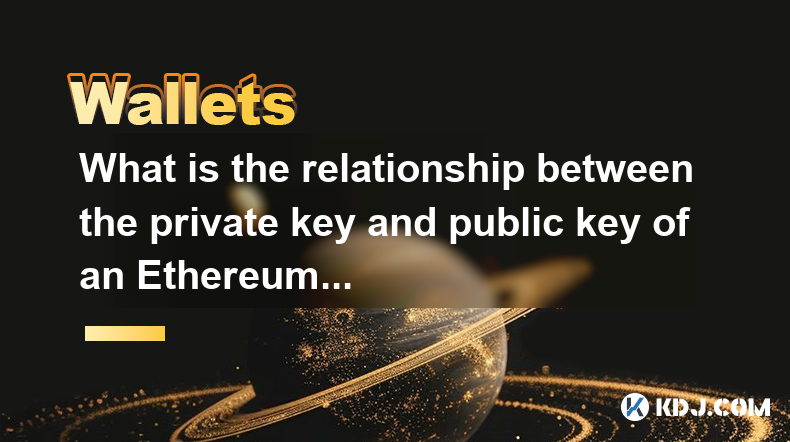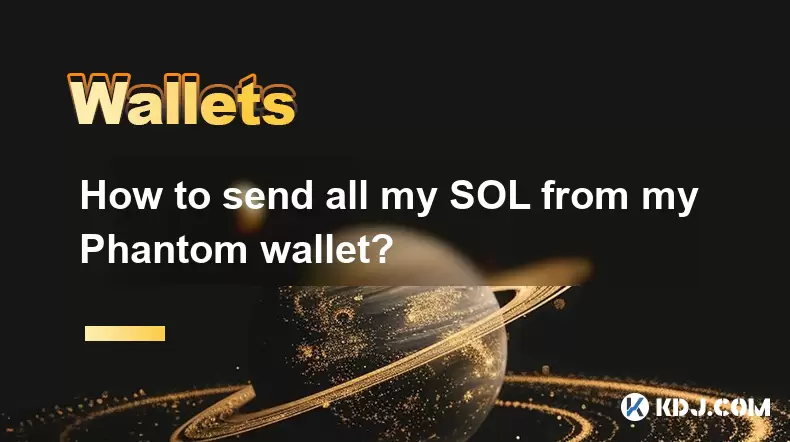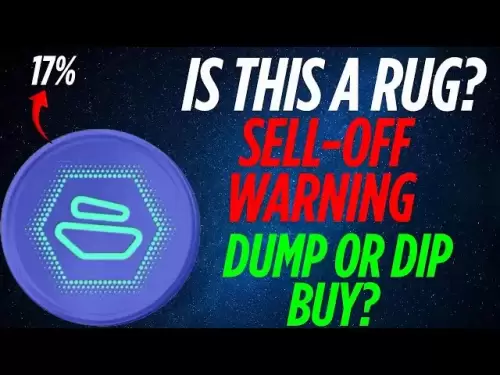-
 Bitcoin
Bitcoin $108,708.8110
0.60% -
 Ethereum
Ethereum $2,561.6057
1.91% -
 Tether USDt
Tether USDt $1.0001
-0.03% -
 XRP
XRP $2.2795
0.57% -
 BNB
BNB $662.2393
1.00% -
 Solana
Solana $153.1346
3.74% -
 USDC
USDC $1.0000
0.00% -
 TRON
TRON $0.2877
0.97% -
 Dogecoin
Dogecoin $0.1710
3.93% -
 Cardano
Cardano $0.5871
1.61% -
 Hyperliquid
Hyperliquid $39.6663
1.68% -
 Sui
Sui $2.9032
0.79% -
 Bitcoin Cash
Bitcoin Cash $496.1879
1.71% -
 Chainlink
Chainlink $13.5807
3.01% -
 UNUS SED LEO
UNUS SED LEO $9.0777
0.61% -
 Stellar
Stellar $0.2514
4.51% -
 Avalanche
Avalanche $18.1761
1.86% -
 Shiba Inu
Shiba Inu $0.0...01173
1.72% -
 Toncoin
Toncoin $2.8010
-4.23% -
 Hedera
Hedera $0.1594
3.21% -
 Litecoin
Litecoin $87.0257
-0.53% -
 Monero
Monero $319.1217
1.79% -
 Polkadot
Polkadot $3.3853
0.68% -
 Dai
Dai $0.9999
-0.01% -
 Ethena USDe
Ethena USDe $1.0003
0.02% -
 Bitget Token
Bitget Token $4.3420
-0.97% -
 Uniswap
Uniswap $7.3772
1.39% -
 Aave
Aave $286.6277
5.61% -
 Pepe
Pepe $0.0...09994
2.33% -
 Pi
Pi $0.4589
1.76%
What is the relationship between the private key and public key of an Ethereum wallet?
Ethereum's private key, akin to a mailbox key, grants access to funds; the public key, like the mailbox address, allows others to send you cryptocurrency. Losing the private key means irreversible loss of access to your funds.
Mar 23, 2025 at 09:14 pm

What is the relationship between the private key and public key of an Ethereum wallet?
The relationship between a private key and a public key in an Ethereum wallet is fundamentally cryptographic. They are inextricably linked through a one-way function; you can derive the public key from the private key, but you cannot derive the private key from the public key. This one-way nature is crucial for the security of the entire system. The private key is like a password, granting access to your Ethereum funds, while the public key acts as your address, allowing others to send you funds.
Think of it like a mailbox. Your public key is your mailbox address, visible to everyone. Anyone can send you mail (Ethereum) to this address. However, only you possess the private key, which is analogous to your mailbox key. Only with this key can you access and withdraw the contents of your mailbox (your Ethereum). Losing your private key is equivalent to losing access to your funds—no one, not even Ethereum developers, can recover it.
The generation of these keys relies on elliptic curve cryptography (ECC). A complex mathematical algorithm generates a random private key, a long string of seemingly random characters. This private key is then fed into the ECC algorithm, which deterministically produces the corresponding public key, your Ethereum address. This address is a shortened, human-readable version of the cryptographic hash of your public key. The process is irreversible.
The public key itself is not directly used for transactions. Instead, it's used to generate the Ethereum address, which is a shorter, more manageable representation. This address is what you share with others when receiving payments. They use this address to send transactions, which are cryptographically signed using your private key to verify ownership.
How is the private key generated?
Private keys are generated using cryptographic algorithms, typically employing random number generators to create a long, unpredictable string of characters. The quality of the random number generator is critical to the security of your private key. Weak random number generators can lead to predictable keys, making your wallet vulnerable. Software wallets generally use operating system-provided random number generators, while hardware wallets employ dedicated, more secure methods.
What is the purpose of the public key?
The public key, although not directly used for transactions, is the foundation of your Ethereum address. It's the component that allows others to send you Ether or ERC-20 tokens. The public key, when hashed using a specific algorithm, results in your Ethereum address, which you provide to others when receiving payments. The public key, in essence, is the recipient's identifier in the Ethereum network.
What happens if I lose my private key?
Losing your private key means irreversible loss of access to your Ethereum funds. There is no recovery mechanism built into the Ethereum network to retrieve your private key. This is a fundamental aspect of the security model: no central authority can access your funds. Therefore, securely backing up your private key is paramount. Consider using multiple backup methods, storing them in physically separate and secure locations.
How are transactions signed with the private key?
Transactions on the Ethereum network require a digital signature to verify authenticity and ownership. This signature is generated using your private key and a cryptographic algorithm. The transaction data is hashed, and the private key is used to sign this hash. The signature, along with the transaction data, is broadcast to the network. Nodes on the network verify the signature using the corresponding public key derived from the address specified in the transaction. If the signature is valid, the transaction is deemed legitimate and added to the blockchain.
What are the different ways to store private keys?
Private keys can be stored in various ways, each with its own security implications. Software wallets store private keys on your computer or mobile device, offering convenience but potentially exposing them to malware or hacking. Hardware wallets provide enhanced security by storing the private key on a physically secure device, making them resistant to software-based attacks. Paper wallets, which involve printing the private key and QR code, offer an offline storage option, but are vulnerable to physical theft or damage.
What is the difference between a private key and a seed phrase?
Many wallets use a seed phrase (also called a mnemonic phrase) as a more user-friendly way to access your private keys. The seed phrase is a list of words that can be used to regenerate your private keys. It is cryptographically derived from your master private key. The seed phrase is crucial for recovery; losing it means losing access to your funds just as losing your private keys does. The seed phrase acts as a convenient and secure backup mechanism for your private keys.
Common Questions and Answers:
Q: Can I share my public key with anyone?
A: Yes, your public key (or more accurately, your Ethereum address derived from it) is designed to be shared. This is how others send you cryptocurrency. Sharing it doesn't compromise your funds.
Q: Can I recover my private key if I lose it?
A: No, there's no way to recover a lost private key. The process of generating a public key from a private key is irreversible. Therefore, securing your private key is of paramount importance.
Q: Is it safe to store my private key on my computer?
A: Storing your private key on your computer is generally considered less secure than using a hardware wallet or a well-protected paper wallet due to the vulnerability to malware and hacking.
Q: What is the length of a typical Ethereum private key?
A: Ethereum private keys are typically represented as 256-bit hexadecimal numbers, resulting in a long string of characters.
Q: How does the public key ensure my transactions are secure?
A: The public key doesn't directly secure transactions. Instead, it's used to verify the digital signature created using your private key. This signature proves that you authorized the transaction. The public key is the verification key for your private key's signature.
Disclaimer:info@kdj.com
The information provided is not trading advice. kdj.com does not assume any responsibility for any investments made based on the information provided in this article. Cryptocurrencies are highly volatile and it is highly recommended that you invest with caution after thorough research!
If you believe that the content used on this website infringes your copyright, please contact us immediately (info@kdj.com) and we will delete it promptly.
- BNB's Bullish Breakout: Riding the $600 Support Level Wave
- 2025-07-08 04:55:13
- Internet Computer, Live Stream, YouTube: What's the Buzz?
- 2025-07-08 04:30:12
- LILPEPE, Bitcoin, 2013: Meme Coin Mania or the Next Big Thing?
- 2025-07-08 04:30:12
- E-Load Super Blast: Sri Lanka's Prize Bonanza!
- 2025-07-08 02:30:13
- Pepe, Blockchain, and Presales: What's the Hype?
- 2025-07-08 03:50:17
- Crypto VC, DeFi Liquidity, and Kuru Labs: What's the Buzz?
- 2025-07-08 02:50:12
Related knowledge

How to cancel a pending transaction in Phantom wallet?
Jul 03,2025 at 07:21pm
Understanding Pending Transactions in Phantom WalletA pending transaction in the Phantom wallet occurs when a user initiates a transfer or interaction with the Solana blockchain, but it hasn't yet been confirmed by the network. This can happen due to various reasons such as low transaction fees, network congestion, or incorrect gas settings. It's import...

How to see the estimated value of my tokens in Phantom wallet?
Jul 04,2025 at 12:21am
What is Phantom Wallet?Phantom wallet is one of the most popular cryptocurrency wallets designed for the Solana blockchain. It allows users to store, send, receive, and manage various tokens built on Solana, including SPL tokens and NFTs. The wallet offers a user-friendly interface, making it accessible for both beginners and advanced users in the crypt...

How to lock my Phantom wallet extension?
Jul 03,2025 at 11:14am
What Is the Phantom Wallet and Why Lock It?The Phantom wallet is a popular non-custodial cryptocurrency wallet designed for interacting with the Solana blockchain. Supporting both browser extensions and mobile apps, Phantom allows users to store, send, receive, and stake SOL tokens, as well as interact with decentralized applications (dApps). Securing y...

Does Phantom wallet offer two-factor authentication (2FA)?
Jul 03,2025 at 09:00am
Understanding Phantom Wallet and Its Security FeaturesPhantom wallet is a widely used non-custodial cryptocurrency wallet that supports the Solana blockchain. It allows users to store, send, receive, and interact with decentralized applications (dApps) seamlessly. As security is a top priority for any crypto wallet user, security features like two-facto...

How to send all my SOL from my Phantom wallet?
Jul 06,2025 at 10:00am
Preparing to Send SOL from Your Phantom WalletBefore initiating any transaction, it is crucial to ensure that your Phantom wallet is fully set up and connected to the correct network. Phantom supports multiple networks, but for sending SOL, you must be on the Solana blockchain. Confirm this by checking the network indicator in the top-right corner of th...

What is "rent" on Solana and how does it affect my Phantom wallet?
Jul 02,2025 at 08:35pm
Understanding 'Rent' on SolanaIn the context of Solana, the term 'rent' refers to a storage fee that users pay for maintaining data on the blockchain. Unlike Ethereum, where storage costs are paid once via gas fees during contract deployment, Solana implements a recurring cost model to ensure efficient usage of network resources. This means that any acc...

How to cancel a pending transaction in Phantom wallet?
Jul 03,2025 at 07:21pm
Understanding Pending Transactions in Phantom WalletA pending transaction in the Phantom wallet occurs when a user initiates a transfer or interaction with the Solana blockchain, but it hasn't yet been confirmed by the network. This can happen due to various reasons such as low transaction fees, network congestion, or incorrect gas settings. It's import...

How to see the estimated value of my tokens in Phantom wallet?
Jul 04,2025 at 12:21am
What is Phantom Wallet?Phantom wallet is one of the most popular cryptocurrency wallets designed for the Solana blockchain. It allows users to store, send, receive, and manage various tokens built on Solana, including SPL tokens and NFTs. The wallet offers a user-friendly interface, making it accessible for both beginners and advanced users in the crypt...

How to lock my Phantom wallet extension?
Jul 03,2025 at 11:14am
What Is the Phantom Wallet and Why Lock It?The Phantom wallet is a popular non-custodial cryptocurrency wallet designed for interacting with the Solana blockchain. Supporting both browser extensions and mobile apps, Phantom allows users to store, send, receive, and stake SOL tokens, as well as interact with decentralized applications (dApps). Securing y...

Does Phantom wallet offer two-factor authentication (2FA)?
Jul 03,2025 at 09:00am
Understanding Phantom Wallet and Its Security FeaturesPhantom wallet is a widely used non-custodial cryptocurrency wallet that supports the Solana blockchain. It allows users to store, send, receive, and interact with decentralized applications (dApps) seamlessly. As security is a top priority for any crypto wallet user, security features like two-facto...

How to send all my SOL from my Phantom wallet?
Jul 06,2025 at 10:00am
Preparing to Send SOL from Your Phantom WalletBefore initiating any transaction, it is crucial to ensure that your Phantom wallet is fully set up and connected to the correct network. Phantom supports multiple networks, but for sending SOL, you must be on the Solana blockchain. Confirm this by checking the network indicator in the top-right corner of th...

What is "rent" on Solana and how does it affect my Phantom wallet?
Jul 02,2025 at 08:35pm
Understanding 'Rent' on SolanaIn the context of Solana, the term 'rent' refers to a storage fee that users pay for maintaining data on the blockchain. Unlike Ethereum, where storage costs are paid once via gas fees during contract deployment, Solana implements a recurring cost model to ensure efficient usage of network resources. This means that any acc...
See all articles

























































































